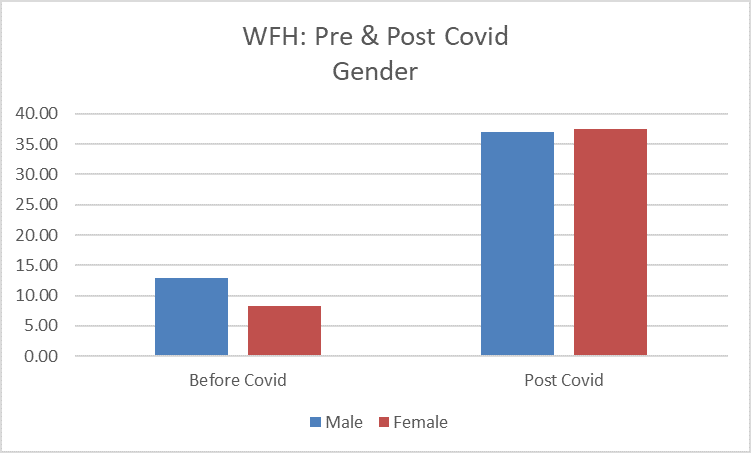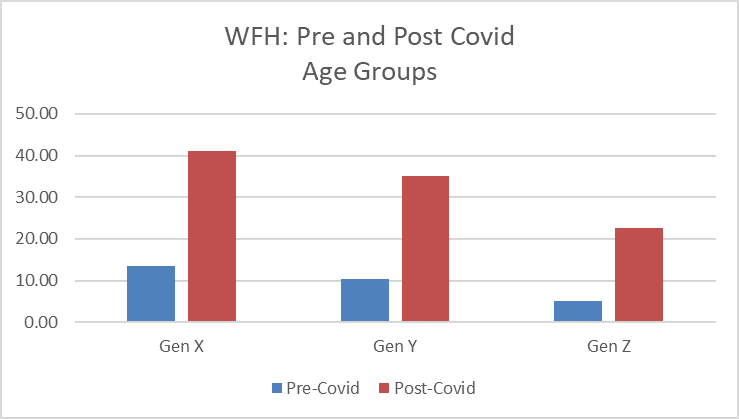
Over the last week Balance has surveyed the Australian IT market to understand if attitudes towards working from home (WFH) have changed as a result of the Covid crisis.
Spoiler alert: If you wish to retain your staff, going back to a pre-Covid approach to WFH is not acceptable to a big chunk of your team. Similarly, if you want to attract the best new talent, you need a clearly articulated and formally documented WFH proposition.
Before and After Covid
Our survey revealed that pre-Covid Australian IT workers averaged just over half a day a week at home. When the crisis has passed, they intend to increase working from home to almost 2 days a week. So there is an expectation from workers to more than triple their time spent WFH.
Importance of WFH When Selecting a New Role
When asked about looking for a new job, 82% of respondents said WFH was an important factor in choosing their next job, with 37% of them rating it as Essential or Very Important.

Gender Balance
We were blown away to discover that pre-Covid men worked 13% of the time from home whilst women worked only 8%. However, there was no significant difference between their intentions re WFH time post-Covid: both intend to WFH around 37% of the time. More predictably, only 5% of women regarded WFH as Not-Important when searching for a new role compared to men at 18%.
Attempting to unpack this result, we were torn between 2 explanations. Were the males surveyed overestimating the time they worked from home and females underestimating? Or were males more likely to ask/demand the WFH flexibility than women.
Regardless we believe organisations are now going to need to measure WFH gender balance as a key metric.

GenX/Y/Z
When it came to age demographics, there were a couple more surprises. GenX claimed to have previously WFH 13.5% of the time. This is more than GenY at 10.26% and GenZ* at 5% .
Gen X expected to work more than 2 days week moving forward, whilst GenY 1.75 and GenZ expected to work only 1 day per week from home. Is it fair or reasonable to see the most experienced workers have the highest rate of WFH?
 * GenZ sample size was not large enough to provide significant confidence
* GenZ sample size was not large enough to provide significant confidence
Managers vs Individual Contributors
Interestingly there was little difference between the habits and intention of managers and individual contributors. However, managers were 2.5 times more likely to see WFH as Essential when choosing their next role when compared to individual contributors.
Our Advice:
Retention
As an employer, check in with your team to make sure they’re comfortable with any new arrangements you establish as you head back to the office. Don’t assume they’re all going to tell you; and if they’re not happy they may already be looking for a role with a more flexible employer.
As an employee, have the confidence to discuss your expectations and concerns re your working arrangements with your manager. Most managers will be open to such a discussion.
Top 3 tips for dealing with WFH during the recruitment process:
- When you are talking to candidates about WFH in your business, be specific, provide data and put it in writing. ‘My team currently work from home an average of 16 hours per week’. Wishy-washy comments about being open to flexible arrangements will now leave you uncompetitive in the race to secure the best talent.
- If you want to attract more female IT talent, WFH is vital. Candidates want you to be specific, especially those with carer’s duties. Clearly describe which aspects of the job can be performed remotely and take a collaborative approach in designing how the role will fit around their commitments.
- Don’t suggest to candidates that WFH is a benefit like a fruit basket. It’s a fundamental expectation for most workers, treat it as such.
As always, we’d love to hear your feedback. And thanks to all of you who participated in the survey.
About Paul:
After 25 years in recruitment, Paul’s wisdom and experience is highly regarded and sought after within the industry. He’s known in industry circles as a thought leader on matters recruitment. Paul co-founded Balance in 2007 and he believes the success of the business is closely related to a ‘customer first’ approach.
If you have a question for Paul contact him here or call on 02 9091 8202.